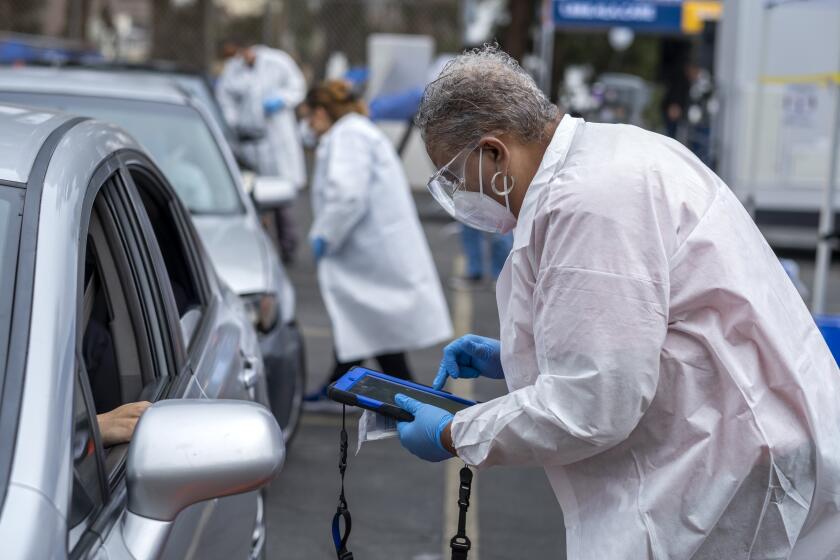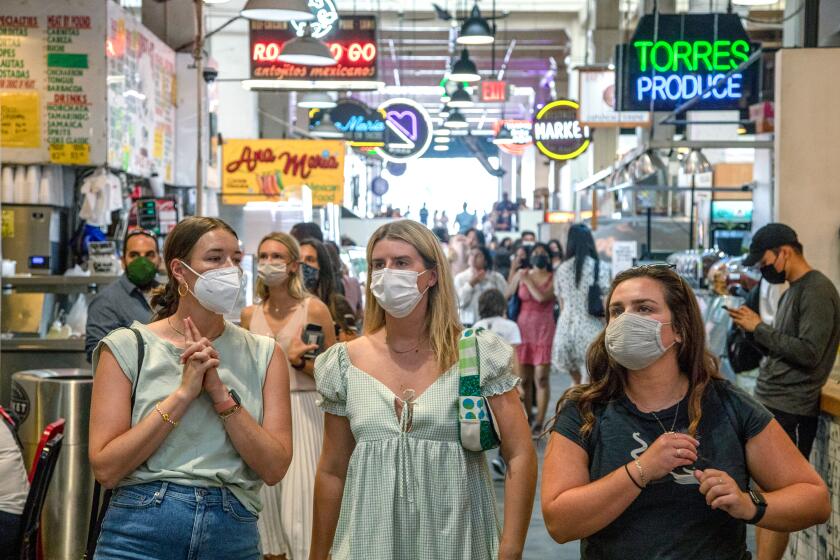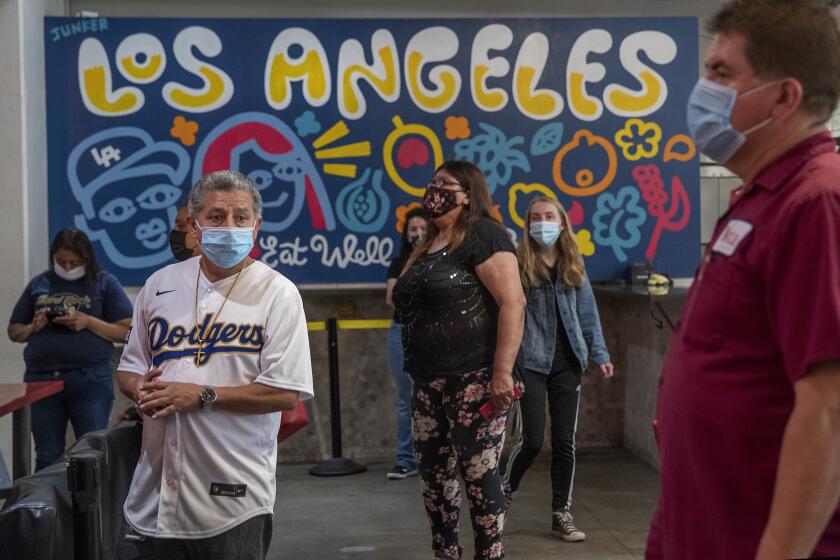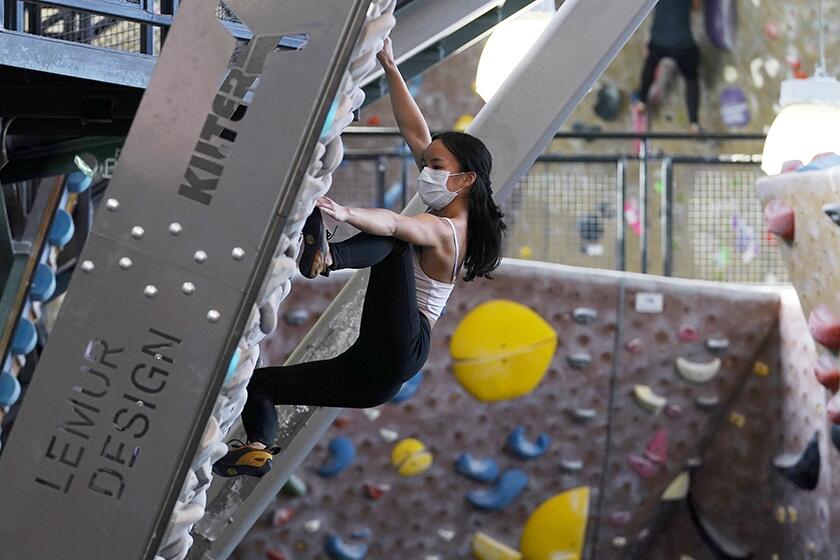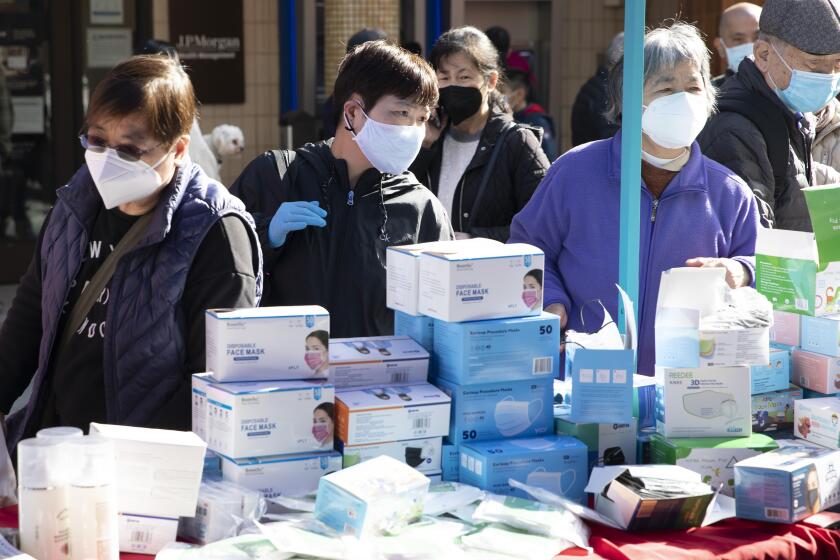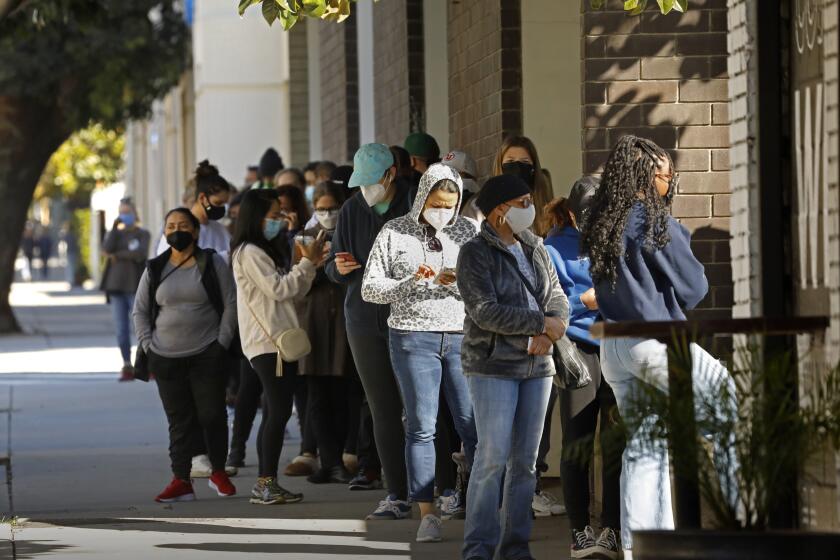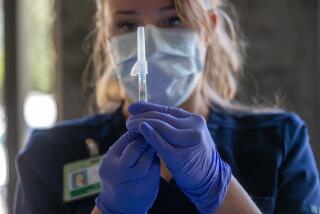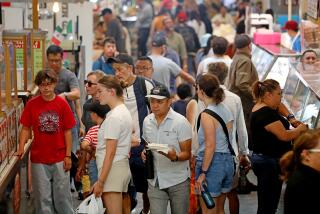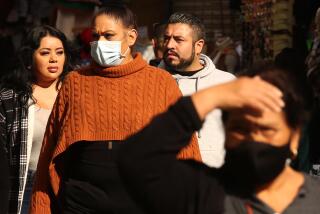L.A. County on track to relax some outdoor mask rules as COVID hospitalizations drop
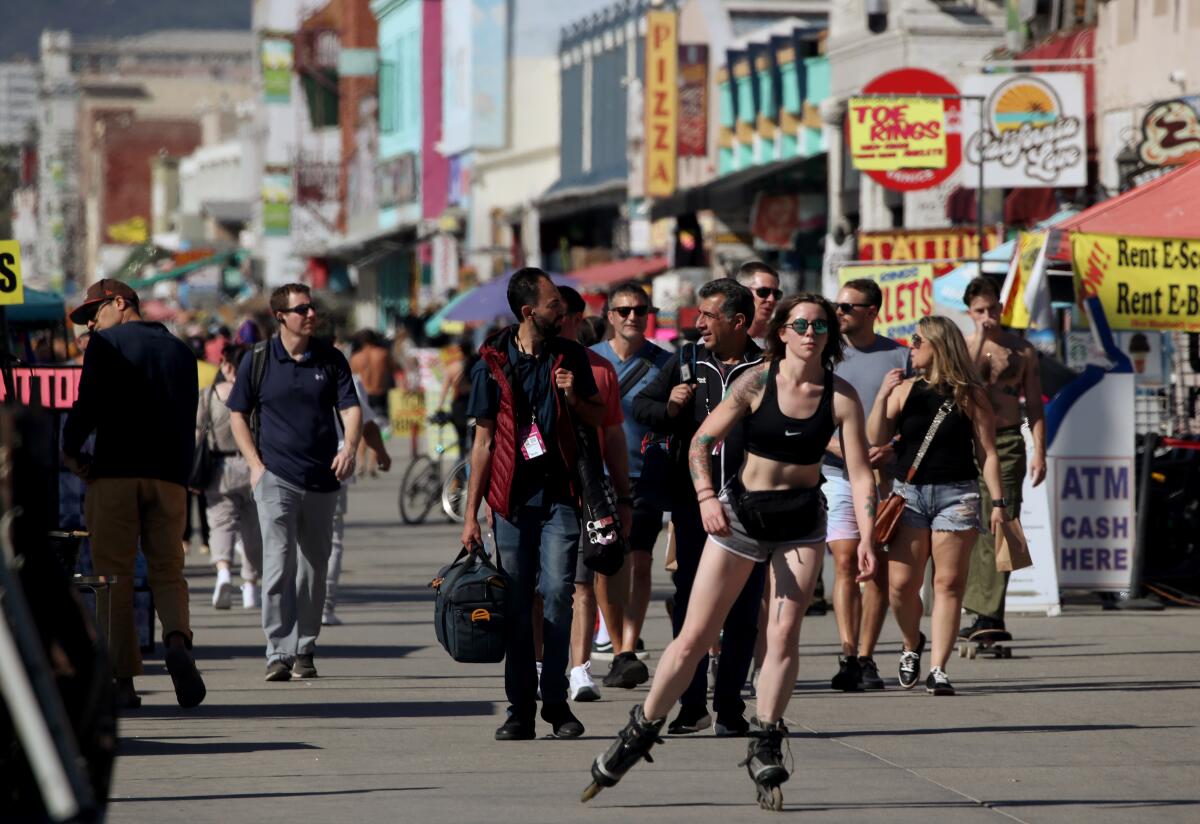
- Share via
The number of coronavirus-positive patients hospitalized in Los Angeles County has dropped below 2,500, putting the region on track to potentially relax some outdoor masking rules as soon as next Wednesday.
Should COVID-19 hospitalizations remain under this threshold for seven consecutive days, county health officials will lift face covering requirements at outdoor “mega events” — including those at venues such as the Hollywood Bowl, Dodger Stadium, SoFi Stadium and Los Angeles Memorial Coliseum — and outdoor spaces at K-12 schools and child-care settings.
That countdown began Wednesday, according to state data released Thursday.
While past is not always prologue, it seems likely L.A. County will be able to lift those select rules next week, based on recent trends. In any case, the requirement will still be in force for Sunday’s Super Bowl at SoFi.
There are more than 1,000 fewer coronavirus-positive people hospitalized countywide now than at the beginning of February. And the latest hospital census is only about half that recorded at the height of the Omicron variant surge last month.
According to state data released Thursday, the number of coronavirus-positive hospital patients in L.A. County on Wednesday was 2,464 — down 27% from the previous Wednesday, when there were 3,398 patients.
L.A. County has averaged more than 70 COVID-19 deaths a day over the last week. That’s double the peak death rate during the summer Delta wave.
This winter’s hospital surge peaked on Jan. 19, when 4,814 coronavirus-positive patients were in hospitals. That’s significantly higher than the summer Delta surge peak of 1,790, recorded Aug. 17, but still lower than last winter’s peak of 8,098, a time when hospital morgues were overflowing.
Hospitals throughout Southern California have suffered so much strain that many have been forced to postpone scheduled surgeries and procedures, and some ambulances were delayed responding to 911 calls. L.A. County’s public hospitals are still suffering staffing shortages related to the coronavirus, and hospitals are not expected to fully recover from the Omicron peak for a couple of months.
“One of the most harmful consequences of this winter surge has been the extraordinary pressure on the healthcare system, forcing many hospitals to postpone routine services and divert patients to other settings,” L.A. County Public Health Director Barbara Ferrer said this week. “The return of most hospitals and healthcare facilities to providing the full range of services needed by patients and residents is an important indication of reduced danger to the county.”
Wider relaxation of the county’s indoor mask rules could come next month.
L.A. County has decided to retain indoor masking rules in public spaces for a few more weeks, maintaining rules implemented locally last July even as California prepares to lift its 2-month-old statewide requirement on Wednesday that all residents age 2 and older mask up in most indoor public spaces.
By contrast, nearby counties such as Orange, Riverside, San Bernardino and San Diego on Wednesday will revert to rules as lenient as the state allows and no longer will require mask use among vaccinated people in many indoor public settings.
After that date, masks will still be required statewide for unvaccinated people indoors and for everyone in certain settings, such as hospitals, nursing homes, homeless shelters, jails and prisons, or while aboard public transit.
All K-12 students and staff also will still be required to wear masks indoors at school, though state officials have indicated that guidance may soon change.
L.A. County is taking a more cautious approach to easing its mask order, noting that the county is still recording high coronavirus transmission rates.
“We are getting closer and closer to making public an announcement on mask wearing in our public schools, and no one looks forward to that more than I do,” Gov. Gavin Newsom said Wednesday. “And, hopefully, in a matter of days, we’ll be putting that out.”
Even as California’s mask order is set to expire next week, health officials are still encouraging people to wear masks while transmission rates are up.
When L.A. County will lift its indoor mask mandate hinges on one of two developments: The county either needs to record two straight weeks of “moderate” coronavirus transmission as defined by the U.S. Centers for Disease Control and Prevention; or COVID-19 vaccines must have been available for children ages 6 months to 4 years for eight weeks.
L.A. County’s daily tally of new cases would need to fall below 730 to meet the CDC definition. According to a Times analysis of state data, the county is averaging about 7,100 cases a day over the past week.
L.A. County is seeing its daily coronavirus case rate cut in half every week, Ferrer said. At this rate, she said, L.A. County would hit the goal between March 7 and March 12, meaning that — as long as daily case rates remain under the goal for two consecutive weeks — the local indoor mask mandate could be lifted by late March, around the start of spring.
“So if everything goes well, at some time by the end of March, we should be able to more safely lift the requirements on indoor masking, obviously knowing that for many people, keeping those masks on is still going to make a lot of sense,” Ferrer said Thursday.
Most of the Bay Area will lift local indoor mask rules next week, with officials saying that the danger from COVID-19 has fallen enough to safely take the step.
Even if that descent hits a snag, however, the other pathway to lift the mask mandate — tied to the release of vaccines for children under the age of 5 — should also be triggered soon.
An advisory panel to the U.S. Food and Drug Administration on Tuesday will consider approving the vaccine for the youngest children, and an advisory panel to the CDC is meeting the following week.
That means vaccines could become available to this age group by the end of February, which would allow L.A. County to lift its mask order by the end of April.
Some have criticized L.A. County’s approach to lifting restrictions as too slow, continuing to subject residents and businesses to a burden that won’t be shared by the vast majority of other Californians.
While County Supervisor Kathryn Barger is “in support of essential measures,” she said she thinks “committing to keeping these in place until late spring is inconsistent with the public health approaches from across the state and the country.”
Masks will still be required for unvaccinated residents indoors and for everyone in select settings such as hospitals and nursing homes or while aboard public transit.
However, the likely timetable laid out by Ferrer forecasts a lifting of the indoor mask mandate late next month.
Ferrer said it’s important to recognize that, for all the recent progress, the coronavirus is still readily spreading throughout the region.
L.A. County reported 6,276 new coronavirus cases Thursday. While down significantly from the height of the Omicron wave, that caseload is still much higher than the 1,850 cases reported Dec. 15 — the day the statewide indoor mask mandate went into effect.
“Transmission is still too high to lift indoor masking in any setting at the moment,” Ferrer said. “We have some of the highest case numbers we’ve ever seen. If it wasn’t for the fact that we’re coming out of the Omicron surge, where the rates were extraordinarily high, we would all be deeply troubled by my numbers today.”
A majority of supervisors have backed Ferrer’s approach, saying they think it’s prudent to keep masks on until coronavirus transmission falls to more modest levels.
“We’ve been wearing masks now for two years. I think that we can probably do it for another month or two,” Supervisor Sheila Kuehl said, voicing concern about lifting the mask mandate so early that it would expose front-line workers to maskless customers while case rates are still high.
COVID-19 will never go away, but the pandemic will be over when the disease becomes ‘endemic.’ Here’s what that means.
The county’s criteria match the CDC recommendation that vaccinated people in indoor public settings wear masks when there are 50 or more cases a week for every 100,000 residents. Getting under that rate brings L.A. County into what the CDC defines as “moderate” coronavirus transmission.
“I know some are worried that we have set an aspirational goal for rescinding indoor masking requirements,” Ferrer said Thursday. “The truth is that for four months last year, from March 18 through July 10, we were in the moderate transmission category every single day. And I think it’s possible to get to moderate transmission again fairly quickly.”
Still, Los Angeles and Orange counties are reporting their highest COVID-19 death rates in 11 months.
Los Angeles County recorded 103 fatalities Wednesday — the highest single-day tally since last March, according to county data. An additional 81 deaths were reported Thursday.
And Orange County reported 136 COVID-19 deaths over the last week, also the highest such number since last March, according to a Times analysis of state data released Thursday.
L.A. County has averaged more than 70 COVID-19 deaths a day over the last week. That’s double the peak death rate during the summer Delta wave, when the county averaged 35 deaths a day, although it remains less than one-third of the pandemic’s high last winter of about 240 deaths a day.
At the current rate, the county is on track to record its 30,000th COVID-19 death within weeks.
“I know this is a particularly hard time and many of us would like to lift the safety precautions more quickly,” Ferrer said. But, “given where we are and the continued risk associated with these high rates of transmission, we’ll need to continue to use sensible safety precautions.”
More to Read
Sign up for Essential California
The most important California stories and recommendations in your inbox every morning.
You may occasionally receive promotional content from the Los Angeles Times.


